I miss funny Dilbert
There was once an article about Jim Davis, creator of Garfield, in which he recognizes the recipe of his success. The trick, it seems, was to make Garfield as inoffensive as possible. No matter what you believe, no matter how delicate your sensitivities are, you can always read Garfield without feeling hurt or offended. Comedians might object that a lot of humor boils down to ridiculing something, so it's worth asking: if Garfield does not offend anyone, how does it manage to keep being funny? The answer should be obvious to Garfield's readers: it doesn't. Because Garfield is not funny.
The reasoning is pretty interesting: Jim Davis' goal was not to be the next greatest American cartoonist, nor to push the boundaries of comic strips as an art form (that would be Bill Watterson). His goal was to make money, and boy did he succeed at that. By being a recognizable, bland, perfectly formulaic icon, Garfield can be adopted by any company or product willing to pay for it. The key, said Davis in this interview, was to make the strip as plain and predictable as possible. "Oh, look,", says the reader, "Garfield is mad because it's Monday". Cue the sound of crickets.
The same, I'm afraid, has happened to Dilbert some time ago. And while it pained me to stop reading after so many years, I've read enough to understand that the Dilbert I liked is gone, replaced by that which he was intended to criticize. Including the archives, I read about 27 years worth of strips, so it was not a decision I took lightly. That was about 4 years ago, and I haven't regretted the decision.
For those who might feel like me, and as a service to the community, I give you the one and only strip you will ever need from now on. It is the culmination of years of Dilbert, and nothing you read in the actual strip will be better than this in the foreseeable future.

Now, in all fairness, congratulations to Scott Adams: he has managed to secure Dilbert in the mind of the public, and he made a lot of money out of it. It was sad to see the old Dilbert go away, but then again, I don't have an animated series nor an (forever in production) upcoming movie to my credit. Having said that, I can only wonder how much more he could have produced if he hadn't rested on his laurels: his Wikipedia achievements have almost entirely peaked around 2010, and he seems to spend most of his time nowadays writing about what an amazing president Donald Trump is. While this is speculation on my part, I believe this might be why his blog is no longer featured on the Dilbert homepage.
I can see why he doesn't need to come with new ideas for Dilbert strips. After all, he has enough money to do whatever he wants. I just wish "make Dilbert funny again" was one of those things he cared about.
Comics are unrealistic
I know this is not in the usual style of this Blog, but I found something so out of touch with reality in Batgirl #36 that I need to share it with you. Please follow me on this journey.
(Warning: spoilers for Batgirl #34–#36. Also, I'm assuming you know who Batgirl is.)
Our story starts in Batgirl #34 with Barbara Gordon (aka Batgirl) missing a meeting with her business partner Alysia and some of her company's investors due to bat-related obligations:
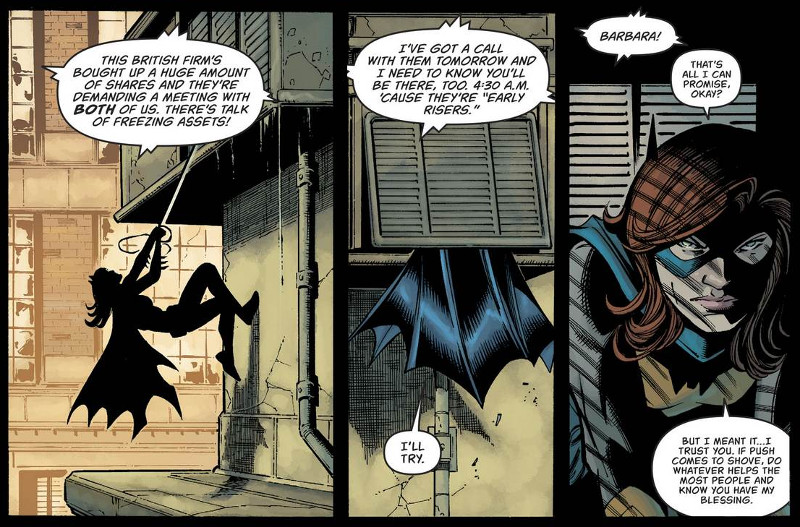
As it turns out, the investors are not happy. They bought plenty of shares in the company, and want to use their position to push Barbara Gordon out:
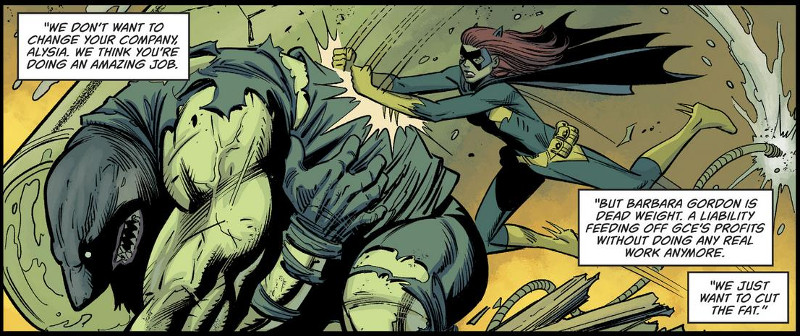
Unfortunately for them, they don't have enough shares to kick her out. Even Alysia tells them so. But they wouldn't be important shareholders if they didn't have a backup plan, right?
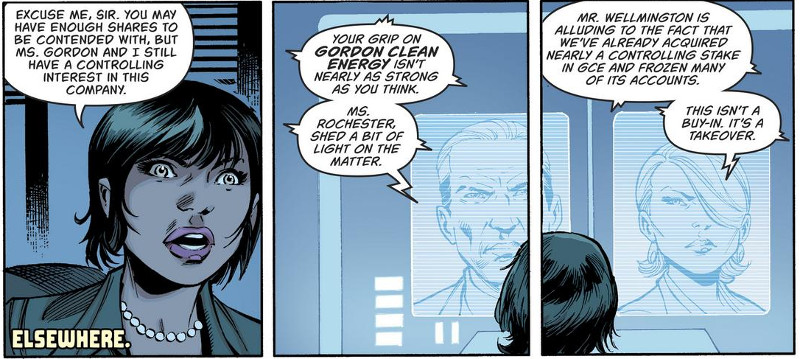
You see: many issues ago, Barbara hired Pamela Isley (aka Poison Ivy, known eco-terrorist and occasional villain) to develop bee-friendly plant fertilizer for their company (it's a long story - see "Batgirl and the Birds of Prey" #12 for details).
The investors have now found out, and want to use this information to blackmail Alysia into kicking her friend out of the company. If Alysia does not agree to fire Barbara, they'll make this information public, tank the company, and put all their employees on the street:
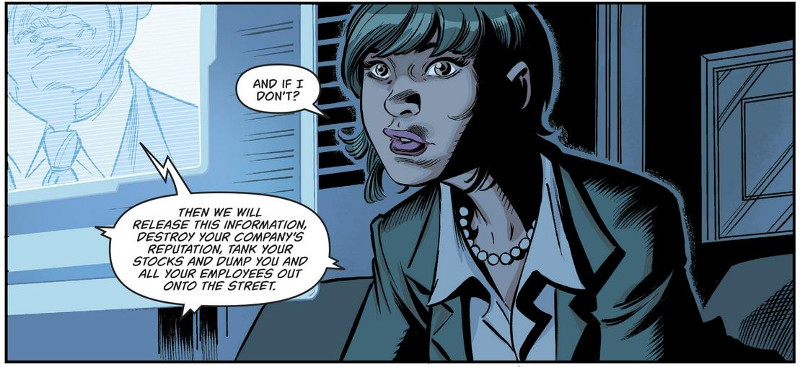
But here's the thing: those investors have acquired a lot of the company. That is, they own it because they paid for it. Do you know what would happen to that investment if they went along with their plan? Yup, you guessed it: gone. All of it. Millions of dollars lost just to spite one of the company's founders. And it's not like they can sell their stock either: doing so in this situation is a clear-cut case of insider trading. Barbara Gordon may end up on the streets, but those investors would end up in jail.
You would expect a smart executive like Alysia to thank the investors for their valuable input, promise to call them back, get a good night sleep, and (at worst) negotiate a good separation agreement for her friend. A less smart person (but smart nonetheless) would have called their bluff: Mutually Assured Destruction is a good stalling tactic, but only an idiot would actually follow through.
Of course, none of these perfectly reasonable suggestions occur to Alysia. She kicks Barbara out of the company instead, leaving her broke and homeless.
And here is where I draw the line. See, I'm fine with the idea of an early-20s super-genius with photographic memory jumping from rooftops and fighting crime without the Police Commisioner noticing that she looks exactly like his daughter. But now you want me to believe that executives from a million-dollar company wouldn't have the simplest grasp of economy? Hell, do you want me to believe that you can organize a hostile takeover, fire a company founder, and freeze their assets in less than 3 hours?! Talk about nonsense.
With that out of the way, and as a final point, I would like to call your attention to Alysia's last words to Barbara. I think you'll agree that her frustration is a little... misplaced.
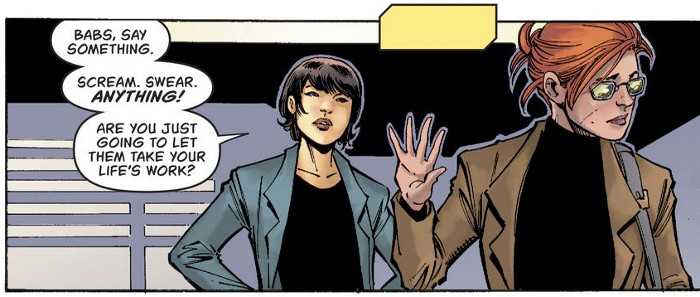
No, Alysia, Barbara isn't letting "them" take away her life's work. That one's entirely on you.
